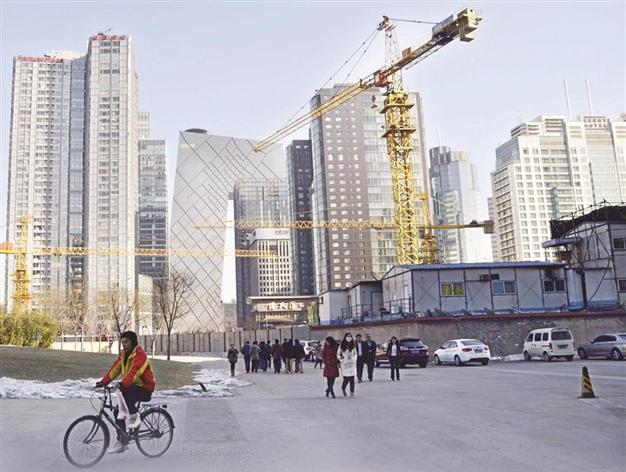China growth rebounds by 7.8 pct
BEIJING - The Associated Press

A Chinese man rides a bicycle past a construction site in a central business district in Beijing. AFP photo
China’s economy is finally rebounding from its deepest slump since the 2008 global crisis, official data has shown, as the country’s politically sensitive income gap between rich and poor peaked has narrowed since 2008, the government said on Jan. 18.The economic growth rose to 7.9 percent in the three months ending in December, up from the previous quarter’s 7.4 percent data showed Jan. 18. For the year, the economy grew by 7.8 percent, which was China’s weakest annual performance since the 1990s.
Retail spending and factory output rose, but analysts say China could suffer a setback if exports weaken or the government fails to maintain investment spending that is propping up a recovery.
“The rebound by itself looks quite shaky,” said IHS Global Insight analyst Xianfang Ren in a report. “While domestic demand looks to be coming back, it looks to be a rather anemic rebound.”
Forecasters expected a rebound in early 2012 but pushed that back after demand for China’s exports was hurt by the sluggish U.S. recovery and Europe’s debt problems. Many expect the latest rebound to peak in coming months before settling back to deliver growth of about 8 percent for the year, well below double-digit rates of the past decade.
“Growth of 8 percent or so is about normal now for China,” said Mark Williams of Capital Economics. “There’s scope for a lot of people to be disappointed, because many still have an inflated sense of how fast China should be growing.”
The slowdown was due largely to government controls imposed to cool a real estate boom and surging inflation fueled by Beijing’s massive stimulus in response to the 2008 crisis. But it worsened as demand for Chinese exports dropped unexpectedly, raising the risk of job losses and unrest.
Global risks
This week, the World Bank cut this year’s growth forecast for China from 8.6 percent to a still-rapid 8.4 percent.
Growth could suffer a setback if China’s high investment rates slacken or global trade weakens, the bank said. It said a 5 percent decline in investment could knock 1.4 percent off this year’s growth and 6 percent off imports.
A separate announcement marked the first time in 12 years that Beijing reported its own calculation of a Gini coefficient, a standard measure for economic inequality. Critics had complained authorities were reluctant to release the number because it would highlight the size of the gap between the elite, who have benefited from three decades of economic reform, and China’s poor majority.
China’s Gini coefficient was 0.474 last year on a scale of 0 to 1, down from a high of 0.491 in 2008, the director of the National Bureau of Statistics, Ma Jiantang, said at a news conference. The government last issued a Gini number for 2000; since then, Ma’s agency has said it knew too little about incomes of wealthy households to do a calculation.
Narrowing the income gap is one of the most pressing issues for new Communist Party leaders who took power in October.
“On the one hand, we need to make the cake bigger, while on the other, we need to do a better job of sharing it,” Ma said.
China’s boom has made multibillion-dollar fortunes for some entrepreneurs but income growth for the majority has been sluggish. Complaints about the lavish lifestyles of Chinese officials and Communist Party figures who drive luxury cars, own multiple villas and send their children to elite foreign universities have fueled political tensions.
















